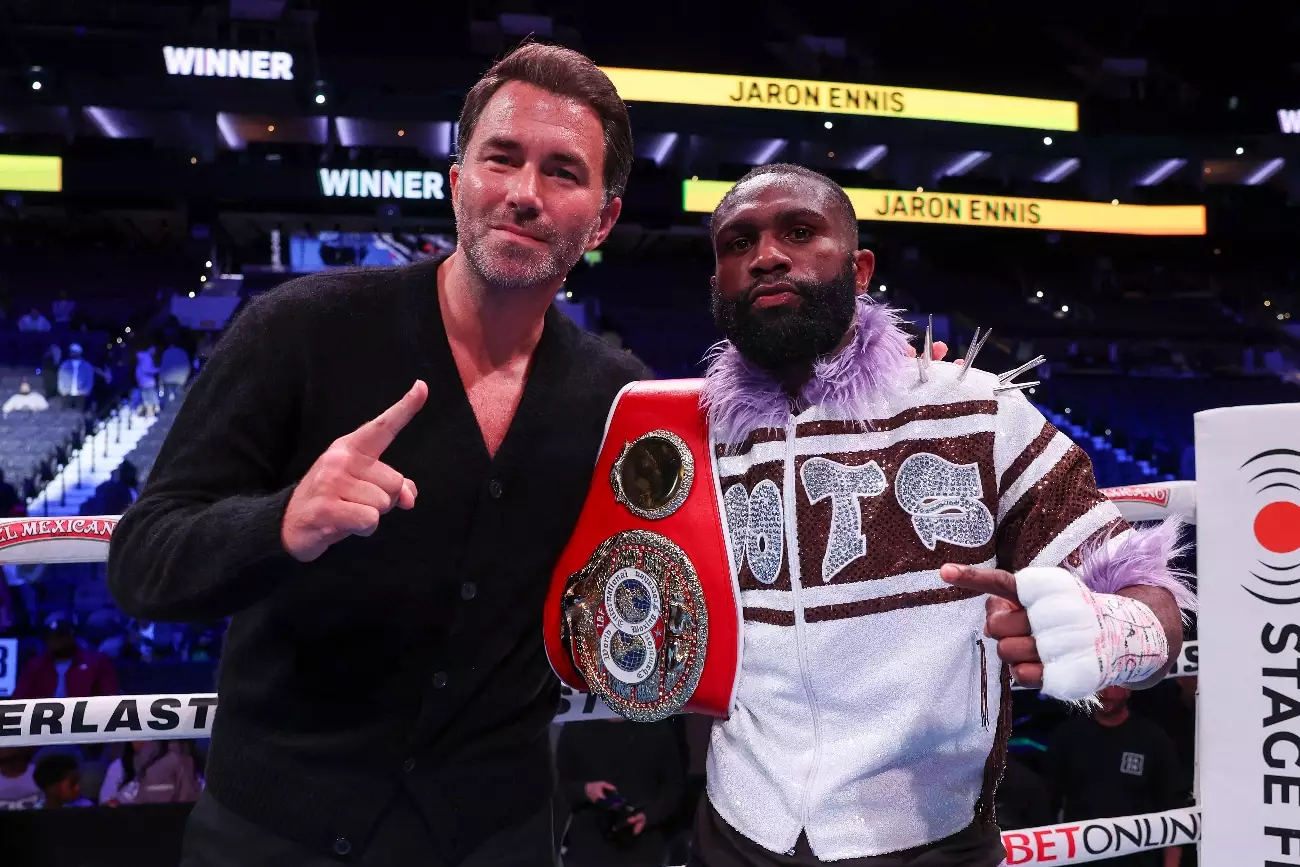The world of boxing is often characterized by strategic maneuvers, financial negotiations, and the ever-persistent question of timing. In this context, the recent comments from promoter Eddie Hearn regarding Jaron ‘Boots’ Ennis and his unification plans at welterweight provide a critical insight into the complicated landscape surrounding one of boxing’s rising stars.
Eddie Hearn, a prominent figure in boxing promotion, has revealed that DAZN has heavily invested in Ennis with intentions to facilitate unification fights at the welterweight level. However, there are indications that time is not on Ennis’s side. At 147 lbs, where competition involves champions who might not be eager to engage due to financial disputes, the call for urgency is pronounced. Hearn emphasizes that if Ennis is to make a move towards unification, it is essential to act swiftly before the window of opportunity closes. This sentiment reflects a larger trend in boxing where champions often hesitate to clash, leaving promising fighters like Ennis stuck in limbo.
Hearn’s frustration concerning the reluctance of welterweight champions to agree to fights is palpable. The champions in question—Mario Barrios, Eimantas Stanionis, and Brian Norman Jr.—have not provided the compelling matchups that would justify their purses. In this light, it becomes clear that financial incentives or lack thereof are profoundly influencing fight arrangements. Hearn faces the dichotomy of wanting to keep Ennis actively engaged while realizing that aligning him with other champions has become increasingly complex. Should the stars align, and the champions lower their financial demands, the potential for unification would appear more viable. As it stands, Hearn is pragmatic; he will not overextend his finances to secure fights if the other parties are unwilling to negotiate reasonably.
Compounding the issue is the prospect of Ennis moving up to junior middleweight. Although this transition could lead to high-profile fights against champions like Vergil Ortiz Jr., the move raises questions about Ennis’s long-term strategy. Would stepping up in weight diminish his chances at becoming an undisputed champion at welterweight? Furthermore, a poorly received performance in his last bout against Karen Chukhadzhian has led some fans to believe Hearn might be steering Ennis away from the 154 lb division for now—a space crowded with formidable opponents that could pose significant challenges. The contemplation of moving up isn’t just a question of weight; it’s emblematic of Hearn’s hesitations and the existing obstacles that hinder Ennis’s ambitions.
Hearn’s comments also suggest a shifting responsibility regarding Ennis’s career trajectory. By indicating that DAZN’s preferences will largely dictate whether Ennis stays at 147 lbs or ventures into the competitive waters of 154 lbs, Hearn cleverly sidesteps potential blame should Ennis’s pursuits falter. This maneuver casts DAZN as a pivotal player in the decision-making process, one that desires the best for Ennis while balancing its investment strategy. The stakes are indeed high for everyone involved, as DAZN’s aspirations for Ennis include high-profile matchups that not only justify their investment but also attract viewership and revenue.
Ultimately, the narrative surrounding Jaron ‘Boots’ Ennis is a microcosm of the broader dynamics at play in boxing, where timing, financial negotiations, and competitive pressures intertwine. Ennis’s ambition to unify the welterweight division appears earnest, but the barriers imposed by both financial reluctance from champions and the allure of moving up to a potentially more lucrative weight class complicate matters significantly. Hearn’s dual focus—pushing for space in the welterweight division while considering alternative routes—reveals the balancing act that promoters face. The boxing world eagerly awaits to see if Ennis can navigate these choppy waters to fulfill his promise and ultimately rise to claim his place among the elite in the sport.

